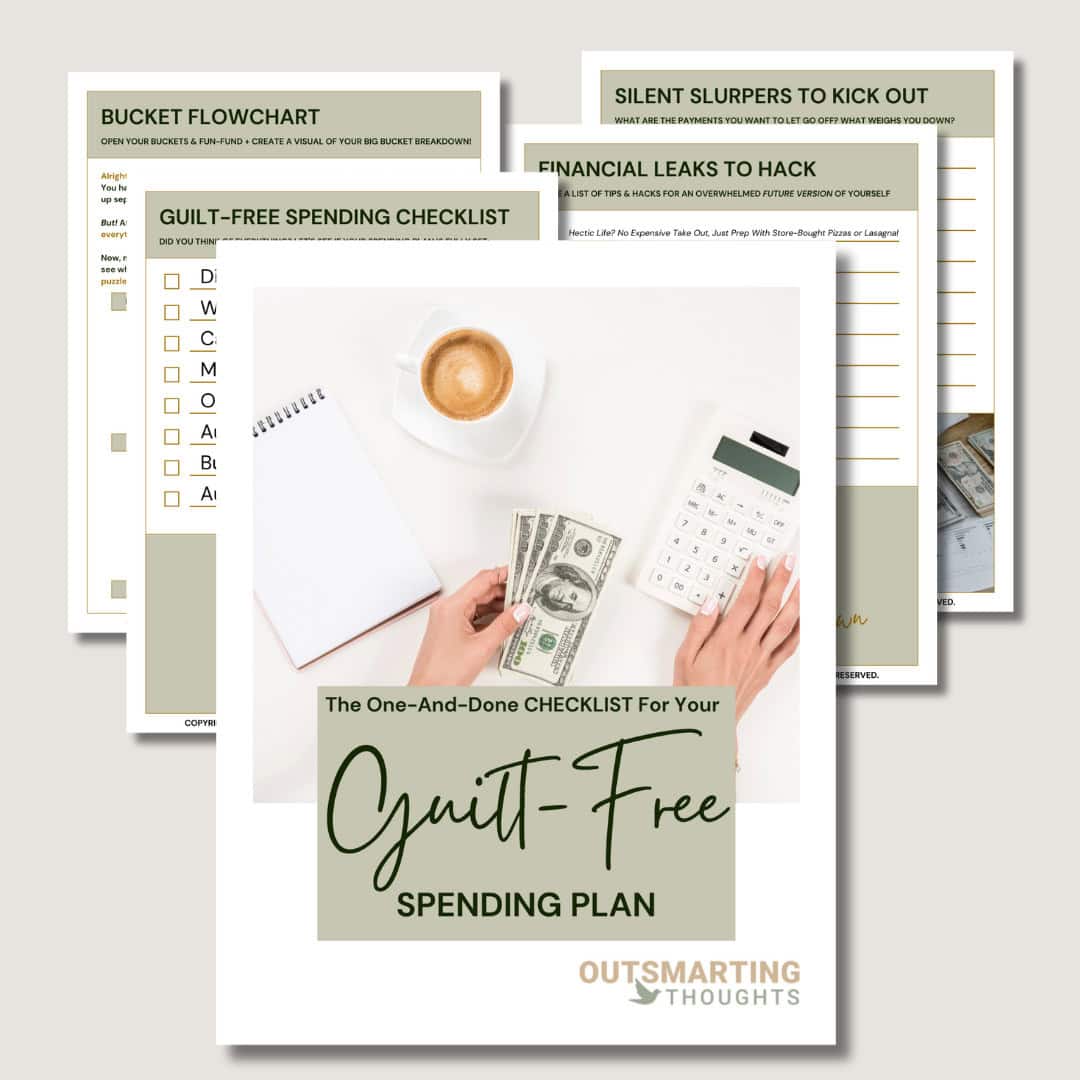Wanna know how overspending and depression trap you in a cycle that feels impossible to escape? It’s not just about the money. It’s about how depression makes it feel like you don’t care about anything anymore. And when you don’t care, it’s very easy to let spending spiral out of control.

When you’re depressed, everything feels exhausting, like your soul is out of bandwidth. Spending, at least for the short term, feels like a huge relief and the only solution to feeling something again. But what you NEED isn’t another dopamine hit. You need to get back into a place where you caretake yourself like you would take care of someone you love. The biggest and quickest shift you can make in this right now? Replacing self-judgement with self-compassion and shifting from careless spending to intentional self-care.
What you’re going to learn is why depression makes it so hard to care, how that fuels overspending, and how to shift toward a mindset of CARE instead of self-hate & self-destruction. We’ll also cover the science behind this whole hell-loop, because this isn’t just about ‘bad habits’. It’s about how depression rewires your brain.
After you’ve learned to spot CARE as the missing link, you’ll be able to start making more financial decisions that are actually aligned with your well-being. This causes less guilt, less stress, and more control over your life. Not just over your money, but over your whole total emotional well-being.
This post is all about the overspending and depression hell-loop, so you can start breaking the pattern by learning how to apply care to yourself and your life again.
Overspending And Depression
Let’s break down the hell-loop of overspending and depression, shall we? It’s where that whole in your heart, the emotional emptiness, leads to compulsive purchases. Very understandably, you just need a short term solution to feeling like crap all the time. However, when regret kicks in later, you’re looping straight back into misery. Of course, these lead to guilt, self-blame and financial stress, making you feel even worse.
Most people carry out a common judgement about overspending being ‘stupid’, ‘reckless’ or ‘irresponsible’. This often comes from the same people who advice you to ‘just snap out of it’, as if depression is a lifestyle choice you just signed up for or something. The issue is, of course, that you CAN NOT just snap out of it.
But here’s the thing: the real missing link isn’t just better self-control of budgeting. It’s CARE. Depression tricks you into thinking you don’t care about your future, money, or even yourself. But the way out of this misery isn’t to force discipline. It’s about learning how to care again.
The Emotional Storm: How Depression Fuels Overspending
Depression makes the world feel dull and lifeless, like you’re stuck under an endless gray sky. It’s not just sadness, it’s losing the ability to care. You don’t care about the future. Depression completely robbed you of your ability to care. You don’t care about money or financial safety. You can’t even care about yourself the way you used to. And when nothing feels like it matters anymore, why not buy something to make you feel better? At least that makes today feel a little less awful.
Spending gives a fleeting illusion of control. It’s a quick hit of dopamine that breaks that miserable state for just a moment. That’s why 31.9% of people with depression struggle with compulsive spending. But once the high wears off, the crash hits HARD. And now you’ve got financial stress on top of everything else, reinforcing the belief that you’re out of control.
But here’s also where everything can shift. Because you don’t need more willpower. You need more CARE. Instead of punishing yourself for overspending, imagine treating yourself like a close friend or child who’s struggling. You wouldn’t belittle them and put them down, would you? If you would care, you would help. You’d ask: What’s really going on? What do you need?
RELATED POST:
Psychological Reasons For Overspending & How To Outsmart Them (Spoiler Alert: It’s Not YOUR Fault!)
This is the missing link. I know it sounds simple, but in depression it’s extremely hard to practice care. Try to shift away from the restricting, and instead focus on understanding. You overspend because you’re hurting. So the first step out of rock bottom isn’t to punish & cut up your credit cards. It’s to acknowledge the pain and start healing and caretaking from there.
The Temporal Trap: Short-Term Gain VS Long-Term Game
Because your ability to care is down, depression hijacks your ability to think ahead too. When you’re deep in it, the future feels so meaningless and far away that it may as well not exist. So long-term planning? Saving money for an awesome goal? That requires caring about tomorrow. And when you hardly even can get through the day, tomorrow doesn’t feel like it matters that much.
That’s why the short-term gain of spending always wins. Right now is miserable, so you NEED relief. The problem is, of course, that every short-term decision adds up to that hell-loop. Debt piles up, guilt increases, and the weight of self-judgment makes depression even worse.
The turning point between the downward spiral and the way back out the hell-hole?
Rebuilding your ability to care. About yourself, and about the future.
This doesn’t mean forcing yourself to set rigid financial goals overnight. But it does mean finding one small thing in the future to care about. Start small. The moment you start caring, even just a little, the cycle begins to shift.
Owning a cashflow strategy is a skill that’ll give you some serious advantages in life. I think budgeting is an aligned action with taking life seriously, and I seriously believe life will reward you for it. If you’re not into high-maintenance strategies like ‘tracking your spending’ and just want to sit down ONCE to direct your financial future, our Guilt-Free Spending Plan Printable is the right cashflow strategy for you! Don’t let anybody outsmart you out of your own money and start budgeting today by simply filling out the form below:

Want a free
ONE-AND-DONE CHECKLIST for aGUILT-FREE SPENDING PLAN? Free up your bandwidth and stop overthinking with this
FREE One-And-Done Checklist for your Guilt-Free Spending Plan!
Simply fill out the form below to get this strategy
delivered straight to your inbox!
The Missing Link: Knowing What You DESIRE & Truly Care About
The biggest lie depression whispers in your ear? Indeed. That you don’t care. But you DO! Just because you’re burned out, exhausted, and running empty, doesn’t mean you turned into a careless psychopath. You DO still care about things. It just feels like it’s been made invisible.
The real missing link isn’t financial discipline. It’s emotional nourishment. You don’t need that next feel-good purchase, you NEED to feel good. What alternatives can you find for dopamine hits that aren’t as damaging?
Instead of asking ‘How the hell do I stop this hell-loop’, ask, ‘What is it that I truly NEED? What do I sincerely care about?’ It can be your parents or kids, it can be your work, or it can be desiring to experience a world tour and seeing every continent. Dreaming up a new life and reinventing yourself can be the spark that made you care again. So please, keep digging until something resonates. Answer the question: what do you care about?
Because this is the truth to it all. You deserve to be here. You have a reason to be here. Life knocked you down, true. But it’s not over. There is a way back up, and that road my friend, no matter how hard it’s going to be, that road is going to make you a resilient bad-ass. Self-care isn’t some fluffy concept about bubble baths and journaling. It’s acting in a way that acknowledges that your life matters. That YOU matter. It’s about treating yourself like someone worth taking care of. Because you are.
How To Break The Hell-Loop And Reclaim Control
Once you’ve found the things you truly want, desire and care about, you can start climbing out of the hell-loop. Unfortunately, this is not a one-and-done, it will still be extremely trying, and you will have to overcome major setbacks on the road. Keep taking good care of yourself. Do NOT fall for the self-blame, judgement and punishment.
Knowing that this cycle wasn’t about being more strict or disciplined, but about learning how to care about yourself again, gives you the upper hand. This is how you shift. Not through shame & self-blame. Not through punishment & deprivation. But through care. You deserve to be taken care of!
RELATED POST:
How To Stop Overspending: The Strategy You NEED To Regain Control (Without The Self-Blame Spiral)
You don’t break the overspending and depression hell-loop by being harder on yourself. Think about it for a second. How mean is it to be so hard on yourself, when you’re already in such a hard time. Can you see how this is pushing you further down to an even more miserable rock-bottom? So please don’t! Break this whole pattern up by learning & discovering how to care again: about your future, your finances, and most importantly, yourself.
Overspending And Depression (Summary)
Overspending isn’t just a money problem. It’s a CARE taking problem. Depression drains your ability to care, leaving you reaching for short-term reliefs. But that’s not what you actually need.
Now that you understand that care is the missing link, you can start to shift out of the hell-loop. Stop the cycle. Start making choices that are aligned with what you care about. Take back control over your life, and reinvent yourself if you desire a new life. Because you’re worth caring about. And it’s time to start acting like it.
This post was all about the overspending and depression hell-loop, so you can start breaking the pattern by learning how to apply care to yourself and your life again.
We aim to help you out as much as possible, but please keep in mind that the content is only for general informational and educational purposes. We offer our services based on independent research and life-experience only, and so our strategies can never serve as a substitute for professional advice. Trust me, we do not have 'everything figured out', are all still huge works in progress, but hey, what works for us, might work for you too! This is allll up for you to decide... It might not work for you, and that's okay, so cherrypick the stuff that resonates and leave the stuff that doesn't, and let's go!







